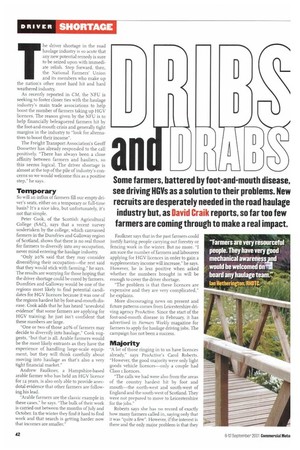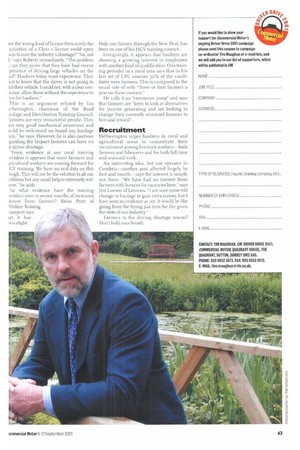Some farmers, battered by foot-and-mouth disease, see driving HGVs as
Page 42

Page 43

If you've noticed an error in this article please click here to report it so we can fix it.
a solution to their problems. New recruits are desperately needed in the road haulage industry but, as David Craik reports, so far too few farmers are coming through to make a real impact.
The driver shortage in the road haulage industry is so acute that any new potential remedy is sure to be seized upon with immediate relish. Step forward, then, the National Farmers' Union and its members who make up the nation's other most hard hit and hard weathered industry.
As recently reported in CM, the NFU is seeking to foster closer ties with the haulage industry's main trade associations to help boost the number of farmers taking up HGV licences, The reason given by the NFU is to help financially beleaguered farmers hit by the foot-and-mouth crisis and generally tight margins in the industry to "look for alternatives to boost their income".
The Freight Transport Association's Geoff Dossetter has already responded to the call positively. "There has always been a close affinity between farmers and hauliers, so this seems logical. The driver shortage is almost at the top of the pile of industry's concerns so we would welcome this as a positive step," he says.
Temporary
So will an influx of farmers fill our empty driver's seats, either on a temporary or full-time basis? It's a nice idea, but unfortunately, it's not that simple.
Peter Cook, of the Scottish Agricultural College (SAC), says that a recent survey undertaken by the college, which canvassed farmers in the Dumfries and Galloway region of Scotland, shows that there is no real thrust for farmers to diversify into any occupation, never mind entering the haulage industry.
"Only 20% said that they may consider diversifying their occupation—the rest said that they would stick with farming," he says. The results are worrying for those hoping that the driver shortage could be cured by farmers. Dumfries and Galloway would be one of the regions most likely to find potential candidates for HGV licences because it was one of the regions hardest hit by foot-and-mouth disease. Cook adds that he has heard "anecdotal evidence" that some farmers are applying for HGV training; he just isn't confident that these numbers are large.
"One or two of those 2o% of farmers may decide to diversify into haulage," Cook suggests, "but that is all. Arable farmers would be the most likely entrants as they have the experience of handling large-scale equipment, but they will think carefully about moving into haulage as that's also a very tight financial market."
Andrew Faulkner, a Hampshire-based arable farmer who has held an HGV licence for 12 years, is also only able to provide anecdotal evidence that other farmers are following his lead.
"Arable farmers are the classic example in these cases," he says. "The bulk of their work is carried out between the months of July and October, In the winter they find it hard to find work and that search is getting harder now that incomes are smaller." Faulkner says that in the past farmers could justify having people carrying out forestry or fencing work in the winter. But no more. "I am sure the number of farmers and labourers applying for HGV licences in order to gain a supplementary income will increase," he says. However, he is less positive when asked whether the numbers brought in will be enough to cover the driver shortage.
"The problem is that these licences are expensive and they are very complicated," he explains.
More discouraging news on present and future patterns comes from Leicestershire driving agency ProActive. Since the start of the foot-and-mouth disease in February, it has advertised in Farmers Weekly magazine for farmers to apply for haulage driving jobs. The campaign has not been a success.
Majority
"A lot of those ringing in to us have licences already," says ProActive's Carol Roberts. "However, the good majority were only light goods vehicle licences—only a couple had Class i licences.
"The calls we had were also from the areas of the country hardest hit by foot and mouth—the north-west and south-west of England and the south-west of Scotland. They were not prepared to move to Leicestershire for the jobs."
Roberts says she has no record of exactly how many farmers called in, saying only that it was "quite a few". However, if the interest is there and the only major problem is that they ive the wrong kind of licence then surely the quisition of a Class i licence could open iors to cure the industry's shortage? "No, not I. says Roberts immediately. "The problem can they prove that they have had recent :perience of driving large vehicles on the ad? Hauliers today want experience. They ant to know that the driver is not going to tal their vehicle. I could not, with a clear conience, allow those without the experience to ive for hauliers."
This is an argument refuted by Ian etherington, chairman of the Road aulage and Distribution Training Council. 'armers are very resourceful people. They eve very good mechanical awareness and ould be welcomed on board any haulage am," he says. However, he is also cautious .garding the impact farmers can have on .e driver shortage.
From evidence at our rural training 7oviders it appears that more farmers and ;ricultural workers are coming forward for CV training. We have no real data on this iptigh. This will not be the solution to all our :oblems but any small help is extremely wel)me," he adds.
So what evidence have the training -oviders seen in recent months of increased Iterest from farmers Brian Pratt of iiltshire Training :ansport says at it has en slight. Only one farmer, through the New Deal, has been on one of his HCV training courses.
Intriguingly, it appears that hauliers are showing a growing interest in employees with another kind of qualification. One training provider in a rural area says that in his last set of CPC courses 30% of the candidates were farmers. This is compared to the usual rate of only "three or four farmers a year on these courses."
He calls it an "enormous jump" and says that farmers are "keen to look at alternatives for income generating and are looking to change their currently restricted licences to hire and reward".
Recruitment
Hetherington urges hauliers in rural and agricultural areas to concentrate their recruitment among livestock workers both farmers and labourers and for both full time and seasonal work.
An interesting idea, but one operator in Cumbria—another area affected hugely by foot and mouth—says the interest is simply not there. "We have had no interest from farmers with licences for vacancies here," says firn Lawson of Lawson s. "l am sure some will change to haulage to gain extra money but I have seen no evidence as yet. It would be like going from the frying pan into the fire given the state of our industry."
Farmers to the driving shortage rescue? Don't hold your breath.




































































































































